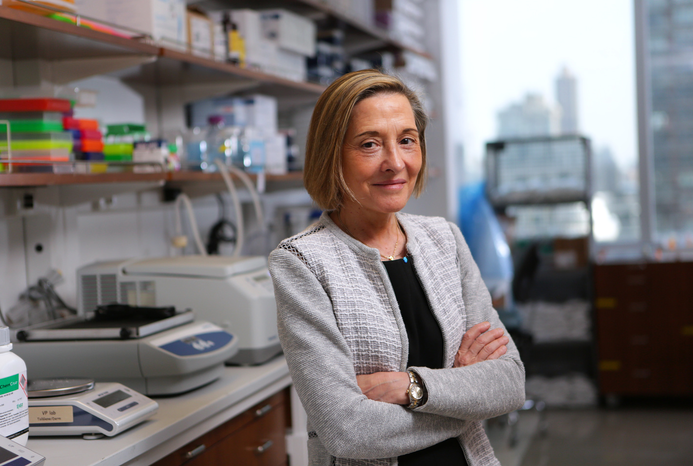Dr. Virginia Pascual, the Drukier Director of the Gale and Ira Drukier Institute for Children’s Health at Weill Cornell Medicine, has been awarded a grant supplement from the National Institute of Allergy and Infectious Diseases (NIAID) to lead a multi-institutional effort studying differences in immune responses in children infected with SARS-CoV-2. The research may reveal why some children with COVID-19 develop major complications while the majority of children only display mild symptoms. A leader in pediatric immunology, Dr. Pascual has also received the 2020 Distinguished Basic/Translational Investigator Award from the American College of Rheumatology (ACR).
The $3 million grant from NIAID of the National Institutes of Health is a supplement to funding awarded in 2019 to Dr. Pascual to establish an Autoimmunity Center of Excellence dedicated to understanding the mechanisms contributing to childhood autoimmune diseases. With the new supplemental award, Dr. Pascual and her collaborators will study why some children exposed to the SARS-CoV-2 virus develop a severe condition called multisystem inflammatory syndrome in children (MIS-C), yet most do not.
MIS-C is a rare syndrome associated with COVID-19 that can cause inflammation in different parts of the body, including the heart, lungs, kidneys, brain, skin, eyes and gastrointestinal organs. The Centers for Disease Control and Prevention began tracking MIS-C in May 2020 and reported more than 1100 confirmed cases as of Oct. 30.
“We are excited that NIAID has entrusted us with this grant in recognition of our work over the years developing new tools for understanding immune system disorders in children,” said Dr. Pascual, the Gale and Ira Drukier Director of Children's Health Research at Weill Cornell Medicine. “These tools will be very useful for understanding why some children develop MIS-C after being exposed to the SARS-CoV-2 virus.”
Collaborating investigators at Weill Cornell Medicine include Dr. Steven J. Josefowicz, assistant professor of pathology and laboratory medicine, and Dr. Olivier Elemento, director of the Caryl and Israel Englander Institute for Precision Medicine, associate director of the HRH Prince Alwaleed Bin Talal Bin Abdulaziz Alsaud Institute for Computational Biomedicine and a professor of physiology and biophysics. The researchers will collect and analyze data on immune system markers from blood, urine and respiratory tract samples, as well as clinical data, including cardiovascular, pulmonary, kidney and liver function, neurological abnormalities and quality of life indices over a period of 12 months in pediatric patients who have had SARS-CoV-2 infection.
At NewYork-Presbyterian Komansky Children’s Hospital, members of Weill Cornell Medicine’s Department of Pediatrics, including Dr. Emily Wasserman and Dr. Karen Acker, are collaborating with colleagues at more than 20 participating centers across the United States to enroll at least 250 study participants.
“Through this exciting collaboration, we may reveal the components of the immune system that are important for successfully fighting SARS-CoV-2,” Dr. Pascual said. “We hope this learning will inform the development of new therapeutics to treat children as well as adults who experience severe inflammatory complications with COVID-19.”
A leader in the field of pediatric immunology, Dr. Pascual also received the Distinguished Basic/Translational Investigator Award on Nov. 9 at the ACR’s annual conference, which was held virtually this year. The award recognizes Dr. Pascual for her pioneering research into the underlying changes in the immune system that cause pediatric diseases such as lupus and juvenile arthritis, and translating discoveries into treatments and cures for patients. The ACR represents rheumatology healthcare professionals worldwide and bestows the Awards of Distinction annually to recognize members’ outstanding contributions in the field.
“I am very honored and proud that the ACR has recognized the importance of my work focusing on rheumatic diseases in children,” said Dr. Pascual, who is also the Ronay Menschel Professor of Pediatrics at Weill Cornell Medicine. “It is important to understand the mechanisms of these diseases, which tend to be more severe in children than in adults, so that we may intervene as early as possible to prevent or slow disease progression over their lifetimes.”

